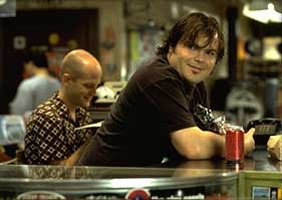ANXIETIES AESTHETIC (AND OTHERWISE)
Bob Archambeau is a colleague of mine here at Lake Forest College. He's a poet, critic, and man of letters. He's also the creator of the blog
Samizdat, which is always worth checking out. Bob has shared with me his essay entitled "The Aesthetic Anxiety," and it's pretty good stuff. The essay addresses avant garde poetry, and the hopes that some poets write onto the avant garde (and other seemingly autonomous forms). I think that much of what he has to say can be applied to the social sciences. Let's take a peek...
In "The Aesthetic Anxiety," Archambeau posits that "many poets have felt the allure of the radical freedoms of an entirely autonomous art." This leads them to face "the anxieties that such autonomy seems, inevitably, to create: fears of losing their readerships, theis social roles, and their political utility." How do they resolve this anxiety? They claim that "a commitment to aesthetic autonomy can, in and of itself, be a form of political action." One imagines a conversation going something like this:
POET: Regard my poems. They're far-out and freaky. They totally re-sort all of the categories of thought that, you know, hegemony has forced on you rubes.
RUBE: God, that's a weird poem. I don't understand it. What's the deal? I've got a second-grader who can put poems together that rhyme. You seem to have become so autonomous that it would be accurate to say that avant garde poets are just talking to each other, in a language nobody can understand. You are, sir poet, politically and socially inefficacious. You do nothing for anybody, except yourself.
POET (shocked): No! You just don't get it, man. These poems are revolutionizing the world. There are whole systems of thought that these poems are altering. The political effect of these poems is not to be found in some ballot measure. The political effect of this stuff--REAL ART, FOR CRYING OUT LOUD--is to revolutionize everything. You can't even handle how revolutionary this is. Ahem: revolution!
RUBE: [disappears into thin air, upon suddenly discovering that rubes and avant garde poets never talk to each other]
This interaction provides a succinct caricature of Archambeau's argument. But Archambeau is much more thorough. He traces the roots of aetheticism to the "alienation from the powerful classes of those committed to imaginative expression." He examines the aesthetic anxiety one finds in Algernon Charles Swinburne's writings. He traces this aethetic anxiety at work in Arthur Symons 1893 essay, "The Decadent Movement in Literature," and in W. B. Yeats' poems. Then he moves into the twentieth century with riffs on Peter Burger, the Surrealists, and the language poets (Charles Bernstein Ron Silliman amongst them). It's a very careful analysis, and fun to read. It should be a book before long.
But heck, I'm no poet. I'm a social scientist. What does this have to do with the stuff that media researchers do? Well, I'm going to go ahead and say it has something to do with us. There's a common theme to be found in the social sciences and in modern poetry. This common theme is autonomy/professionalism, and while social scientists may escape the aesthetic anxiety (as Archambeau describes it), there does seem to be a professional anxiety at work.
Okay, Pravda, you say. What is this professional anxiety? Well, I'm glad you asked. In the social sciences, the anxiety about the autonomy provided by professionalism often involves the public. Professionalism often progresses in a manner that enhances the autonomy of those within the profession (cf. Eliot Freidson, Magali Larson, Andrew Abbott). Professionalism is classically thought of as inward-looking. Professionals look not to the public, but to their peers, for professional validation. The social sciences, though less 'professionalized' than, say, medicine, still work in a roughly similar fashion. We use jargon, we look to each other for validation, and we establish networks within our disciplines/fields.
But surely we social scientists don't have an avant garde that casts its own autonomy as a blow for the revolution, right? Well, I suppose not. But we do have anxieties that arise from our own professionally-derived autonomy (to the extent that it exists). We often deal with issues that are blatantly relevant to the public, and yet we just as often remark how little the public cares about it, or how sad it is that it is all written in a jargon that does not lend itself to the sustenance of a non-expert audience.
As a grad student in communication, I recall many discussions ending in an ironic appreciation of how little our work mattered to the outside world. But instead of spurring those in communication to become more autonomous, and to make the (let's call it gutsy) argument that being crazy and drenched in theory would revolutionize THE WORLD, instead communication seems to be in a position where those who feel this anxiety are give up on communicating with the public (which is too bad, I suppose) or find a way to muster some sense in which their research can be thought to actually matter. Frequently enough, this latter option means sacrificing intellectual autonomy to those who actually do have power. This can involve simply fitting research interests into the pre-existing interests of funding organizations. Christopher Simpson's famous book Science of Coercion provided a well-known and important demonstration of how some of the 'founding fathers' of comm research hitched their methods and some of their ideas to the interests of the CIA and other groups. To a great extent, the supposed successes for the field of communication (as detailed every month in the National Communication Association's Spectra) have come from capturing grant money. I believe this indicates a lack of structural autonomy in the field of communication. We feel the anxiety of autonomy/professionalism, but our response is not to come up with some claptrap about the revolutionary value of 'out there' theory, but to get busy and figure out how to fit our intellectual interests into the needs of those around us. And I think that's too bad.


